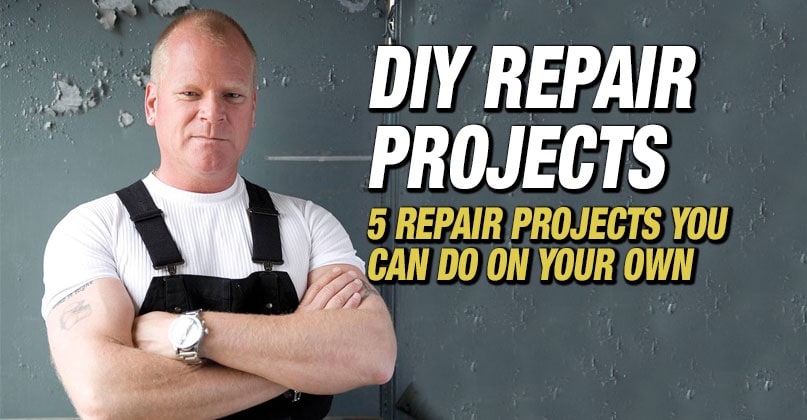I love exploring new technology—especially when it genuinely improves how we work in construction—and I recently came across one that truly impressed me, iGUIDE by Planitar Inc. In my...
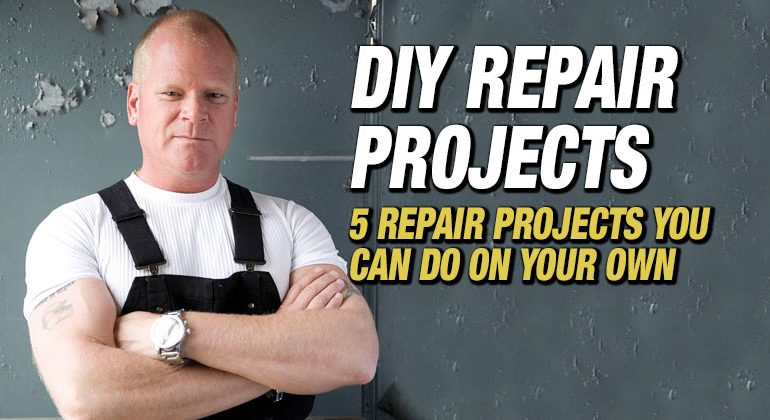
5 Repair Projects You Can Do On Your Own (DIY)
By Mike Holmes
Mike’s Advice / Home Renovation
Wednesday, March 18th, 2020 @ 9:10am
When you start to spend more time at home, you can really get to know the imperfections or just those things that drive you crazy. If you’re anything like me, you’ll start making your wish list of projects – and find that it never ends.
Now you know me, I’m not a DIY guy. I believe that you should hire a pro to do the job right the first time. That said, my kids love their DIY projects and are getting me to ease up on this a bit, and I’m ready to admit that there are SOME jobs that homeowners can do on their own. As long as they have the right tools and knowhow.
Now – jobs you should never do on your own are concerning the major structure of your home. I’m talking about the roof, foundation, electrical, plumbing – things like that. But here are five DIY repair jobs that you could probably handle on your own.
5) A Fresh Coat of Paint
To me, painting is the perfect beginner DIY job to test your skills. Why? As a purely cosmetic job, if you do happen to mess something up – the only thing you have to live with is an ugly wall. That’s not the case when you’re taking structural jobs by yourself!
So what are my tips for painting it right? Start with a good wipe down. Wipe down your baseboards with a damp cloth. For most rooms, you don’t have to wash the walls, but in spaces like kitchens or bathrooms which can have lots of grease and grime build up – a warm soapy solution is a good start. If you’re a smoker, you’ll probably want to wash any wall before you paint.
Repair any nail holes in the drywall from hanging photos, or general wear-and-tear. Do a quick sanding, fill it with compound, and then sand it again. Then apply your primer to the walls – so the paint will be able to stick.
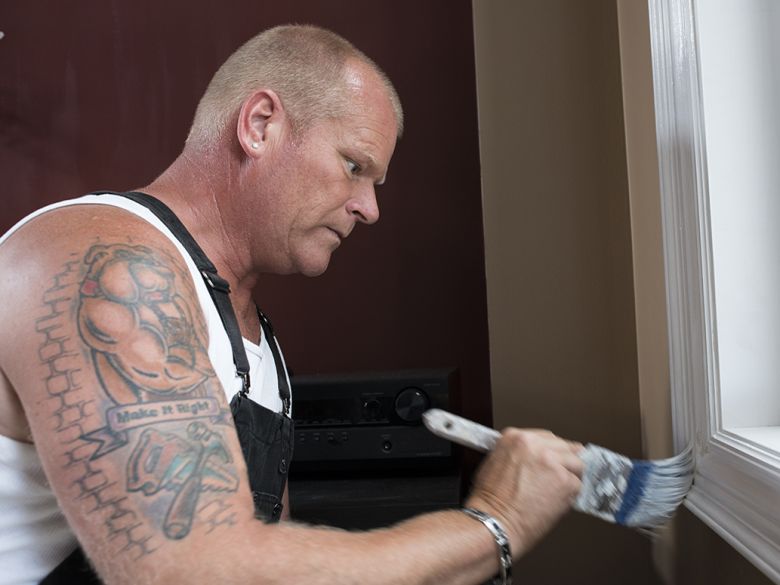
Then you’re ready to paint!
View Mike’s Interior Painting Tips
DRYWALL TIP:
If you have screw pops or dents in your bathroom walls and need to fill it or fix it then watch my video below.
4) Replacing Old Caulking
Drafts can account for 30% of a home’s heat loss. That’s pretty significant for what seems like just a few drafts around doors and windows.
In the spring and fall, you should do a walk around and take a good look at all your doors and windows. You’re looking for places where the old caulking has worn away or is missing altogether.
When you’re adding new caulking, you want to scrape out all of the old stuff, apply an even bead of new caulking, and then smooth it out. Use a small piece of wood – don’t use your fingers to smooth it out.
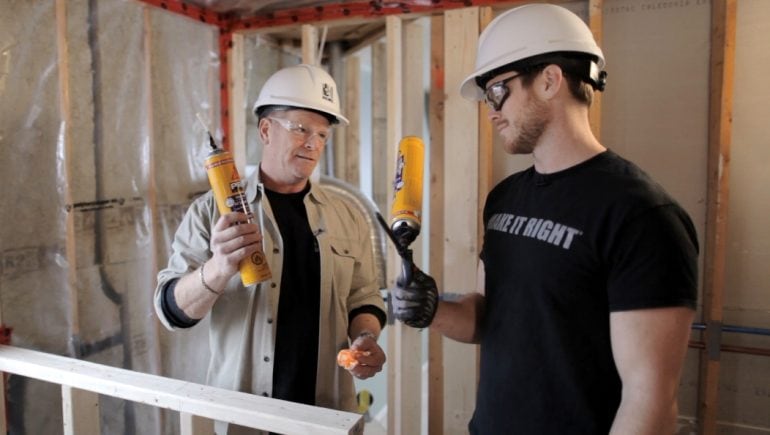
Make sure you use flexible caulking that can expand and contract with the house. We personally use Sikaflex.
3) Fixing Cracks in the Walkways
Are cracks in your walkway a big deal? It might not seem like it, but during the winter months, cracks can allow water to penetrate into the walkway, freeze, and then as that water freezes and thaws, it will begin to heave out of the pathway, creating a serious hazard.
But when the cracks are still small, you can fill them in yourself pretty easily. By small crack, I mean one that’s thin enough that you can’t fit a coin in. You can use any concrete repair compound to fill in those small cracks – but on our job sites, we use Sikaflex Concrete Fix.
2) Mending Fences
When spring comes – you want to do a full circle around the exterior of your home. The goal here is to determine what damage if any, the winter did to your home.
When it comes to your fence, you want to look at each board and post – and look for instances of rot. If one board has started to fail, if left alone, it could easily spread to the rest, and take out your entire fence.
Replacing rotting posts and boards is a simple job you can handle on your own.
With Sika Post-Fix you can easily replace a broken fence post on your own. Make sure you place it below the frost line!
1) Home Maintenance Checks
I know the fun jobs are related to the way your home looks – the things I like to call lipstick and mascara, but these are tasks every homeowner should have on their to-do list to keep their homes running and keep their homes safe.
So what maintenance checks should you be doing?
Check your HVAC filters monthly. A clean filter will keep your machine running more efficiently. At a minimum, you should be changing them every three months – but I do mine monthly. If you have to run the HVAC during a major renovation, I would even change it every two weeks.
Every month you should be testing your smoke and carbon monoxide detectors. But how often should you change the batteries? If you don’t have hardwired units – change the batteries twice a year.
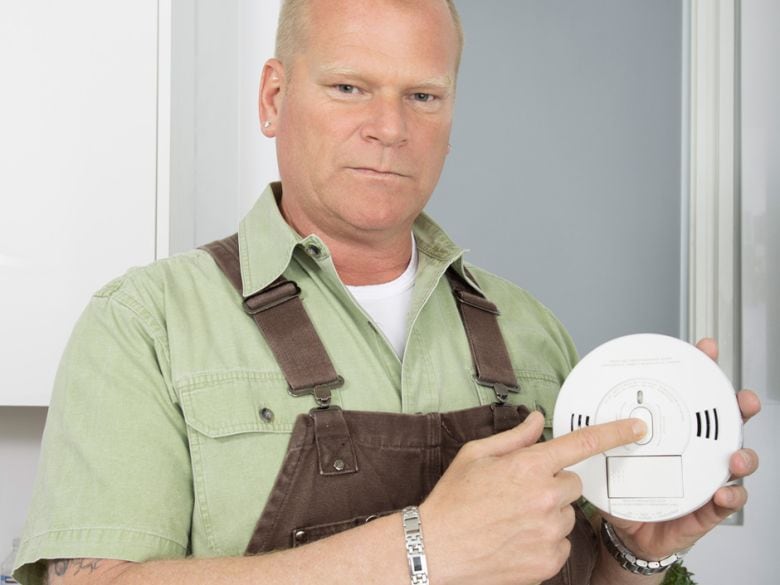
I change mine when the clocks change – it’s how I remember to do it.
The units don’t last forever – they should be replaced every ten years or so. Next time you go to test it, check the date on it. It’ll let you know if you need a new unit.
NEED MORE TIPS?
